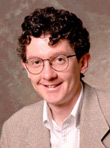Seamus Davis elected to National Academy of Sciences
By Bill Steele

J.C. Séamus Davis, the J.G. White Distinguished Professor of Physical Science, has been elected to the National Academy of Sciences. He is one of 72 new members and 18 foreign associates from 14 countries selected in recognition of their distinguished and continuing achievements in original research.
"I'm amazed and delighted. I had never considered such an honor," Davis said.
Davis, who also serves as a senior physicist and director of the Center for Emergent Superconductivity at Brookhaven National Laboratory, conducts research into the behavior of superconductors and superfluids at temperatures close to absolute zero in order to learn more about the fundamental physics of matter. His primary tools are incredibly sensitive scanning tunneling microscopes capable of resolving features smaller than the diameter of an atom, with which he is able to observe the energy states of electrons.
His research, in collaboration with other scientists at Cornell and Brookhaven as well as in Japan, Ireland, Germany, Canada and elsewhere, has opened new understanding of "high-temperature" superconductors, which conduct electricity with zero resistance when cooled to temperatures up to 148 degrees above absolute zero. Knowing how these materials work could eventually lead to the design of materials that will superconduct at room temperature.
Davis received his B.Sc. in physics from University College in Cork, Ireland, in 1983, and his Ph.D. from the University of California-Berkeley in 1989. Before joining the Cornell faculty in 2002 he was professor of physics at Berkeley. He is a fellow of the Institute of Physics and of the American Physical Society. In 2009 he was awarded the Heike Kamerlingh Onnes Prize for Superconductivity Experiments, regarded as one of the most prestigious in the field.
The Academy elected its new members during its 147th annual meeting April 27, in National Harbor, Md. Those elected bring the total number of active members to 2,097.
The National Academy of Sciences is a private organization of scientists and engineers dedicated to the furtherance of science and its use for the general welfare. It was established in 1863 by a congressional act of incorporation signed by Abraham Lincoln that calls on the Academy to act as an official adviser to the federal government, upon request, in any matter of science or technology.
Get Cornell news delivered right to your inbox.
Subscribe